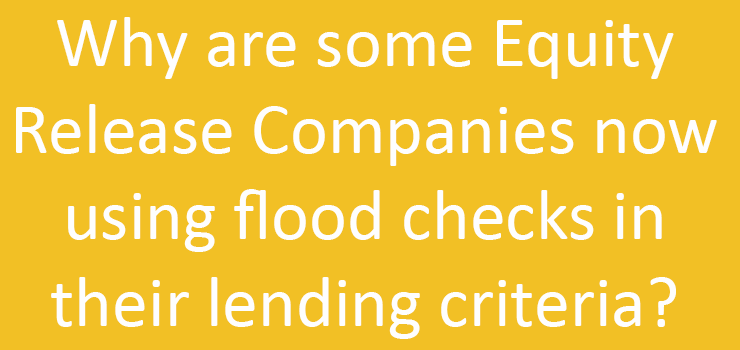Equity release schemes are especially designed for the over fifty fives’ age group and represent a good way to raise finance for retirement, larger purchases or inheritance planning. However, they can be a little complex to understand and many people remain confused as to why a risk of flooding can have an impact on the lending criteria.
The factors considered during equity release
There are a number of factors which are considered during equity release. Standard application criteria will usually involve personal details of the applicant including their age, gender and possibly their state of health. However, the criteria for the property details can be a little more complex. Basic information such as the current market value and the balance of any existing mortgage secured on the property has always been a major consideration. However, equity release companies are now often considering other specific lending criteria factors such as the risk of flooding, whether the property is lease or free hold and whether there are any trees adjacent to the property. These factors can all have a great impact on the potential value of the home at the end of the term for the scheme, when the property must be sold to repay the balance of the equity release lending.
Why the lending criteria is so specific
Equity release providers are heavily regulated and need to ensure that the balance of the loan does not ever exceed the value of the property. Since most equity release schemes are designed to be lifetime plans, there can be a significant amount of interest accrued and compounded on to the balance of the loan. This is the main reason why there are certain qualification criteria applied and the percentage of equity release available can be restricted by certain factors including age.
Criteria such as risk of flooding and being in a geographical area prone to storms or extreme weather may seem unrelated. However, these factors can have an impact on the market value and re-saleability of the property. Since the equity release is secured on the property, the equity release company must be confident in their investment for your property. Factors such as a risk of flooding could discourage potential buyers or cause structural damage to the property. Therefore, if these more specific elements of lending criteria apply to your property, you may find restrictions are imposed on equity release schemes.
Flood Checks
Flood checks are now becoming a common occurrence in equity release applications. These checks usually involve an independent assessor visiting your property to assess the risk of flooding. The assessor will evaluate the impact adverse weather conditions could have on your property and whether it at risk of flooding in the event of severe rain fall. For example, while you may enjoy an idyllic river view with your property sat near the banks of the river, should rain fall be excessive there would be a high risk of your home flooding should the river burst its banks. This could cause significant structural damage to the property which would compromise its value. In cases such as these, equity release does not represent a sound investment for the equity release company and you may have difficulty securing a scheme.
Assessing the lender criteria for your specific property
There are a number of online tools including calculators which have been pre-programmed with the specific lender criteria for the products which are linked to the website. This can provide a good insight into whether your property would be subject to restrictions due to a risk of flooding or some other property detail which could compromise the future value of the property. If you are considering equity release but need clarification about whether your particular circumstances would meet the lending criteria, these online tools can be an excellent place to start. They can provide clarification of whether you would qualify for an equity release scheme and provide some figures on which you can base your calculations. It is advisable to check a number of different calculators to ensure that you obtain a full picture of the schemes which are available on the marketplace. Of course, these tools and calculators cannot replace the expert advice of a professional equity release adviser. However, they can provide some reassurance of qualification and allow you to make an informed decision about whether you wish to proceed.
If you are interested in equity release and worried that your property may be at risk of flooding and not qualify for a scheme, it is best to speak to an experienced equity release adviser. They will be able to discuss your concerns and recommend an option which is best suited to your requirements and circumstances.

